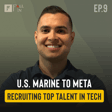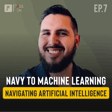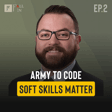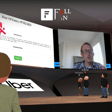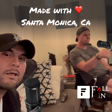Become a Creator today!Start creating today - Share your story with the world!
Start for free
00:00:00
00:00:01

Fall Into Tech #4: Keith Pickering - Marine to Enterprise Tech Sales
Former Marine infantry officer Keith Pickering shares his journey from military service to enterprise sales in the tech industry. Discover:
- Keith's transition from the Marines to becoming an enterprise account executive
- Insights into the world of B2B and enterprise sales in tech
- The value of networking and "1000 cups of coffee" in career transitions
- How to leverage military experience in strategic sales roles
Whether you're a transitioning service member or curious about tech sales, this episode offers valuable insights into succeeding in the business side of tech.
GUEST INFO:
EPISODE LINKS:
PODCAST INFO:
- Podcast website: https://www.fallintotech.com/
- Youtube
- Apple Podcast
- Spotify
- Zencastr
SOCIAL MEDIA:
HOST INFO:
Transcript
Introduction: Veterans in Tech
00:00:01
fall_in
All right, welcome back to the fall into tech podcast. Ladies and gentlemen, hosted by my friend Michael Rodriguez, and myself, Jamil Mattin, we're two Marines turned techies. And on this podcast, we chat with fellow veterans about their journey from military to the tech industry, as well as other tech professionals who can help you with your tech career.
00:00:25
Michael Rodriguez
Yeah, tune in weekly for guest interviews where we discuss specific tech roles, career paths, and different tips for succeeding in tech.
Meet Keith Pickering
00:00:34
Michael Rodriguez
And today we have Keith Pickering on. Thank you, Keith, for being here. um Keith is a former Marine turned tech enterprise account executive. And I actually met Keith back when we were both students at the basic school in Quantico, which is where um marine lieutenants go to get initial training before they hit the fleet. And then we actually met back when we were both instructors there um before we kind of got out of the Marine Corps. So really appreciate you having you on, Keith. um And we like to start with a fun little segment of, hey, tell us a fun fact about
Military Life: Challenges and Choices
00:01:09
Michael Rodriguez
yourself.
00:01:09
Keith
Yeah, for sure. Well, Jamil, Mike, thanks for for having me on this. I'm excited to ah be part of this and give back however I can. Yeah, Mike, it's funny. ah Full circle back at the at the basic school there. um Fun fact, you know I think ah something always interesting that I can talk about myself is my time station in Hawaii. For any military station in Hawaii, I feel like they either love it or hate it, you know hate the island. feel or absolutely love it. i I loved it personally. I will say when I first got there, a couple of the new lieutenants, I guess lieutenants that had been there decided to take me out surfing. It took me out into surf that was not exactly easy for a first timer. I kind of just got beat up by the waves for like a couple hours and didn't try surfing again for another a year after that. And when I did, I absolutely loved it. um I miss Hawaii. It was certainly a great time for sure.
00:01:56
Michael Rodriguez
Actually, I feel like, I don't know, like, I feel like everyone tries to surf for some reason.
00:01:56
fall_in
but
00:01:59
Michael Rodriguez
I bought a surfboard, I still have it for no reason, when I was living down in Surf City by Camp Lejeune and I could like barely swim, so I don't know why I thought that was a good idea.
00:02:10
fall_in
Well, Keith, so tell us a little bit about, you know, what years you were in and super curious about, you know, why did you choose the Marines versus any other branch?
00:02:21
Keith
Yeah, for sure. um So I ah went to college, Duquesne University, and then commissioned in 2013. And I was in until 2021. um Why the Marines? I you know i think ah a big part of it was just because it seemed like the most challenging. you know I think that was my my drive to it, like like a lot of Marines. um It seemed like the most difficult branch, like the hardest thing to to do. um So I think that's why I ended up there, for better or worse.
00:02:47
fall_in
rough And um could you tell us a little bit about what your military occupation and some of the roles and units you were part of?
00:02:58
Keith
Yeah, for sure. So I was an infantry officer. I immediately walked to Hawaii and was a platoon commander.
00:03:01
fall_in
right
00:03:05
Keith
And then I was a weapons platoon commander and then moved up to the battalion level and was a battalion assistant operations officer and did a couple of deployments and rotations out to East Asia there. And then after that came back to the basic school and I was an instructor there, a war front instructor in the bullpen with Mike here for a bit. And then went out and I was a platoon commander for the warrant officers going to that school and then finished my time just before leaving the military as the operations officer of the martial arts center there in in Quantico.
00:03:37
fall_in
Very cool. So you must have picked up like a black belt if you're somewhat of an instructor out there.
00:03:41
Keith
yeah
00:03:43
fall_in
Is that right?
00:03:44
Keith
Yeah, I was, uh, I think I was a brown belt. Um, and I think I made it clear, like when I started operations officer there that, uh, that probably is going to remain a brown belt for me during my military career. Um, those guys were were really, uh, a great crew to to work with, uh, true professionals and, uh, uh, good fighters to say the least.
00:04:03
fall_in
Nice.
Transitioning to Business
00:04:04
fall_in
And you know, thinking back during your time of sort time and service, what would you say were the best parts and worst parts of being in?
00:04:12
Keith
Yeah, but I think the best part to know, it's funny how much I see it now being in the role that I'm at, but I really loved the fast pace aspect of it, you know, dealing with the unknown. I think of a couple of specific times when we were ah trying to get some operations done in in Korea and Thailand and some other places and not all the ducks were in a row, so to speak. And it was kind of fun, I don't know, just, just dealing with the chaos and making things happen. um And so I kind of missed that to to some extent. That was a and ah fun and interesting part about being in in the military, being overseas and just figuring things out. um Worst part, I think, like everybody, bureaucracy a bit, right? It can be it can be a little ah overwhelming. It just felt like change kind of didn't happen. Like it wasn't even possible, I think, at at times, which simplified things sometimes, right? I was like, okay, this is an obstacle we're going around.
00:05:03
Keith
um But now I think being in a civilian career and it's you know things that everybody knows should change and it's widely agreed upon that it should change, it actually does. Not immediately, but it actually does does happen. And so that's definitely been relieving for sure.
00:05:19
Michael Rodriguez
Nice. Yeah. And obviously we were both kind of the last same last duty station before we decided to get out curious to hear why you decided to get out and why specifically tech, if you could kind of tell us more about that.
00:05:35
Keith
Yeah. So, um, I don't want to make it sound like I had it all figured it out cause that's not, not the case. Um, but when I first went into the military, it it was kind of deliberate. It was, uh, it was this kind of dumb quote from a guy that was spoken at my brother's high school graduation. And he said, live your life backwards. Uh, and I've kind of followed that. and thought about like what kind of things do I want to do ah looking back on on life. And so Marines and military in general was kind of first up on that list and that was really important to me. And I kind of plan on doing four and then getting out. But I actually really enjoyed ah that first role especially being out with a battalion.
00:06:10
Keith
um But then ah the other part of looking living life backwards and kind of looking back on on life was I wanted to try my hand at at business and you know really give that a shot and see if I can find success in in business and be independent and ah you know make things make things happen, so to speak. So it was always kind of on my bucket list was to get into business. And ah that was a big driving factor for me getting out of the military was to to try that out.
00:06:37
fall_in
Nice.
Breaking into Tech
00:06:38
fall_in
um you know As you're getting out, could you tell us what resources you use to transition in into the tech ah sector?
00:06:45
Michael Rodriguez
Thank
00:06:46
Keith
Yeah, for sure. So three primary ones, I went through a nonprofit called Commit Foundation.
00:06:52
Michael Rodriguez
you.
00:06:54
Keith
Have either of you guys heard of Commit Foundation? So it's great.
00:06:56
Michael Rodriguez
No.
00:06:58
Keith
I think it's primarily focused for retirees. I think I was one of the younger individuals going through that program, but they do a good job of helping you, it sounds corny, but understand your why, right? Really understand what it is you're optimizing for in your next role, the types of things that you enjoyed about the military and the types types of things that you did not, ah the types of roles and situations that you thrive in and kind of what you're looking for and in the next chapter of of your life. And so they do a really good job at that. I think they they do they do workshops on like a monthly basis with with veterans and they really help you understand some of that background
00:07:36
Keith
And then a key tenet of that is they have this concept called a thousand cups of coffee. And i'll I'll butcher their explanation of it. But the the basic of it is just if you have a thousand cups of coffee, you're going to find what what you're looking for. And what it means is just talk with a thousand people, right? Go out there and meet and talk to as many people as you possibly can and tell them your why, tell them what you're looking for and what you're optimizing for and ah things will happen for you. And so I did that. um And that really led me to Vetterati, which is a great way to connect with other veterans. And I'm um'm active on there today. And then it also led me to another foundation. So the third foundation kind of program I'll mention is Breakline. And Breakline is an organization that helps veterans specifically get into tech roles. And so Commit Foundation to help me understand the background, Vetterati, to have those conversations and help people help me, right? Tell them what types of things I'm looking for and help
00:08:30
Keith
give them an opportunity to refine what it is I'm looking for and tell me what I should be. And then Breakline, which is ah a for-profit organization that actually helps you get roles in that they're kind of like a placement type agency.
00:08:42
fall_in
Very cool. um you know I've definitely heard a break line. I was never a part of it. I was definitely a part of Vetterati. Could you talk to us about some of the resources that you think we're lacking? um Sounds like these you know are great resources, but did you notice notice anything that these three resources were um unable to fulfill?
00:09:05
Keith
No, I mean, those three resources were really critical for me. I think the military is like, you know, out processing and program that is lacking for sure. And I will say that the one thing I got from them is that person told me that Arati and I think that Arati is where I started having these conversations that led to commit foundation.
00:09:17
fall_in
Yeah.
00:09:23
Keith
So, you know, I think those three organizations were a good a good mix for me and we're necessarily lacking anything. But as far as transition in in general, yeah, there's there's a lot of missing resources there. I think that the process of leaving it in general is, I think everyone agrees that needs to be changed. Back to what I was saying earlier, right? Everyone like knows this needs to change. It's just going to take a couple years for the military actually does it.
00:09:50
fall_in
Definitely.
00:09:50
Michael Rodriguez
Gotcha. And um kind of going back to you said you use breakline, and they're, they help you get into tech roles. Can you kind of describe how you actually legitimately got your first job in tech, specifically?
00:10:06
Keith
Yeah, for sure. Um, a preface with, it was 2021. It was an absolutely great year for hiring and in in general. I don't think things are like this anymore. Um, but I went through breakline while simultaneously having lots of better audio calls. And so breakline. basically learns about your background that help you translate skills and help you adjust resume and help you kind of talk about your experience in a way that will translate well to hiring managers inside of tech companies. and this They do a lot of like the initial training, but then the other thing they do is they actually open doors for you and they'll you know get you first interviews with tech companies, with their their partners that they've they've partnered with.
00:10:46
Keith
And so I think from Breakline, I had at least three or four job offers that came out of Breakline itself. um And then I had another one or two that I got from just better oddy and really not better on this sort of just networking in in general so those two combined. um ah And breakline helped me with this time all those things that I really had like five total job offers to to choose from, which is a really great spot to be in and then all I had to do is rely on the work that I'd done in commit foundation of like.
00:11:17
Keith
which one of these is going to be absolute best suited for what I'm optimizing for and the types of roles that I'm good at. I know I'll succeed in um and that really helped me kind of make the decision amongst those different job offers and and land where I am today, which is on tick.
00:11:32
Michael Rodriguez
Yeah, can you kind of tell us decision process on you have multiple roles? How did you actually go about picking one and dissecting the different roles and landing
Choosing the Right Tech Role
00:11:43
Keith
Yeah. The roles I had could be generally grouped into two different ones. It was program management type roles. So I think there was, there was one with AWS, one with Facebook and another with a ah really early stage startup those were kind of program manager type roles, and then other ones were sales roles, which is where I ended up. but I think the decision between those two and actually I had a mentor call me when I was trying to make this decision and I was leaning towards AWS. It's a program manager role. It paid well. I knew I'd do well in it because program management is kind of what we all do in the military, right? um And she called me and I forget the exact quote, but it was something along the lines of ah
00:11:43
Michael Rodriguez
on this one?
00:12:24
Keith
if you wanted to ah develop and and lead teams inside of a inside of a program, inside of a very large bureaucracy, and you said you love the Marines, then why didn't you just stay in? And that's the way she worded it to me. I was like, all right, you kind of got me on that. um You're right, I left to learn business and understand business. And I know the best, at least at at at the time, I thought, you know, the best way to learn business is through ah doing sales at a startup. And so that's what led me to my current role, which is a sales role inside of an earlier stage company. And true to form, I've learned just a ton about business, which was my goal and kind of what I was optimizing for.
00:13:01
Michael Rodriguez
Nice. And before we jump into what your current role is, can you tell us a little bit about what a program manager would be for kind of listeners that might want to be exploring that route?
Tech Sales: Roles and Responsibilities
00:13:13
Keith
Yeah, let let me go through the ah Facebook program management role because it was interesting because I was wondering the same thing. I was like, you know, there's a bunch of there's a million programs inside the military and, you know, different teams to lead like the martial arts center. Right. And so I was expecting something like that. I just didn't know exactly what it looked like. But during that interview process, I really learned about it. And basically this role was going to be From what I understand, in charge of a team of other people who were going through business Facebook profiles and just checking to see if they were legitimate or not. So understanding if these were legitimate ah businesses that should have a page on Facebook or if they violated some sort of policies and they should be
00:13:53
Keith
removed. And so, you know, that's everything military, right? it It's managing teams, it's process, it's procedure, it's it's policy, it's making sure you're not missing things and attention to detail. And so that's what that role was going to look like. And the one at AWS was was similar. It was program or I think that was project manager of the Academy student outcome. So its some very long title. And it was basically like figuring out, you know, how successful people were after going through the AWS Academy certifications and figuring out the numbers behind that and understanding how successful that program was. And so it's that type of thing, right? It's it's a problem somewhere that needs to be solved that involves leading people and accomplishing objectives and kind of getting things done for the organization.
00:14:45
Michael Rodriguez
Awesome. Yeah, that makes sense. And now for your current role, you're an enterprise account executive. Before you kind of tell us what that is, and kind of day to day of it, is that a role you can get as soon as you join the company? Or is that something you have to work into, work up to?
00:15:03
Keith
Yeah. So I think both. ah there's There's opportunity. So enterprise account executive is a really ah kind of strange title that just means sales person. It just means like sales rep. um But yes, you can get that role like right out of military, not here at this company, but there are enterprise account executive roles that you can get out of military. They just, they might not be enterprise. They might be other type of account executives that are maybe sell into small and medium-sized businesses, or maybe they are selling to enterprise, but it's very transactional, sort of you know fast, low-price ah sales situations. and so Those roles are achievable. and If I remember correctly, I think a couple of our peers did start immediately into account executive roles. I actually did an intermediary role here first, which was sales development representative.
00:15:52
Keith
which was much more of like calling and emailing and just trying to get conversations generated with the people and then turn it over to an individual who would then close the the opportunity. And so that's the role I'm in now. But when I first started, it was much more of like working for a person like myself to get those leads and get those opportunities started.
00:16:11
Michael Rodriguez
Gotcha. So you kind of start in a role where you found potential leads and then you kind of pass them off to the role you're in now. And sales always kind of confused me when I was first trying to get out and I was hearing about sales roles. I understand the general idea is to sell someone something and all that, but can you kind of walk us through a day in the life of what that actually means for someone working in that?
00:16:29
Keith
Yeah.
00:16:34
Keith
Yeah, I did not see myself in sales. It was that that mentor of mine that I keep referencing. She really told me know the best way to learn business, besides getting an MBA, which which I did ah virtually before I got out. um But it was like, go do sales at a start when you're going to learn business very, very quickly. And so I do i do find that to be true, and and it was great. But you know, I never would have pictured myself in a sales role because this is a stigma, right? There's ah a thought of like, they use car salesman type type thing for sales people out there. And the reality is at this at this level, which is which is higher price points, it's it's strategic, you know enterprise level,
00:17:13
Keith
situations that we're were're working towards, it's much less of that. It's much more of just ah its business, right? it's It's understanding the unique value proposition that the company that you're working for offers. It's understanding the different business competition in the space. it's understanding someone else's business really well. right So understanding you know who this this person is um that's trying to solve a problem that's inside of their very large organization. And then it's just creating a mutual agreement between both parties. right It's a mutual exchange of ah value. and And you'll further on that, the the beauty of the SAS model, the software as ah as a service, it's a subscription model where basically
00:17:53
Keith
you know it's It's important to not just get the initial sale, but make sure that's a great client and that they're happy right and continue to to see value. And so you can't make bat bad deals in in this business because maintaining that recurring revenue is just as important as signing that initial initial contract. And so um as far as like understanding how businesses work and how they make money and how ah value is derived from products and services, ah sales is a really great opportunity to understand and and learn more about that.
00:18:20
Michael Rodriguez
And when you say enterprise, just for people listening, you think of sales, you think of the car salesman, like you said, which is just one person to one person. But now this is enterprise being you're selling to a company, correct?
00:18:33
Keith
Yeah, so so if someone says um if someone says like B2B sales and and you're looking at sales roles, it's just business to business. So you're right, you're selling to a a company versus B2C, which is business to consumer, versus B2G, which is business to to government. But then there's another layer of of question of, okay, you're selling to businesses, but what type of business, right? Is this a small or medium ah size business where it's much smaller transactional type opportunities, or is this enterprise or strategic sales where youre you might only actually sign, you know,
00:19:09
Keith
seven, eight agreements on a yearly basis, but they take maybe six to nine months to actually get to that that point. um And so when you say selling, a lot of it is is actually just at first getting that person to see the value and make sure that you're a good fit for them. But after that, it's actually really about helping that person sell internally. So we primarily here sell to ah Fortune 500, very large companies, right? 50, 60,000 employees plus. And they have a lot of bureaucracy, just like I dealt with and and we all dealt with in the military.
00:19:41
Keith
And they have a lot to deal with. And so a lot of it is helping them buy internally. So it's having conversations with them about creating a business case, creating a case for change, finding budget within their large organization, and then going to present that ah to you know executives inside of these large companies to say, yes, we need to invest in this in the software. So that's kind of what it looks like, if that's helpful.
00:20:05
Michael Rodriguez
Yeah, I guess that was going to be one of my questions of why these six months, you know, you think of the car salesman, you're like, all right, I'm in, I'm out for one day, maybe come back next week.
00:20:11
Keith
Yeah.
00:20:12
Michael Rodriguez
But it sounds like you have a lot to do maybe with the contract and all of that before, you know, you can deliver it.
00:20:16
Keith
For sure.
Networking and Sales Tools
00:20:21
Michael Rodriguez
And one question I just thought of was how do you find these leads? You said before you were in the role of finding leads and then kind of passing them off. Like, how do you even find these, these leads?
00:20:32
Keith
yeah It's funny, a lot of the work that I did getting out of the military and the thousand cups of coffee and networking, that's really how you get leads in this business. So when you're talking enterprise, ah you know, strategic level sales, it's less of ads and emails and, you know, clicking things and going through a sales funnel and more of just knowing people and having conversations. And so the industry that I'm in is is corporate security. And so there's actually a lot of, it's not cybersecurity, it's more of like the physical aspect of of corporate security. So it's actually a lot of former military, it's former law enforcement, former three-letter agency. And these are the the people that kind of run physical security programs inside of these large organizations.
00:21:15
Keith
And so coming from a military background, it was really beneficial because it's it's easy to make a connection and and we have a mutual background where we understand each other a bit right from the start because of that mutual background. And so a lot of the way of generating leads is less of what you're thinking and and more of networking and going to conferences and events and handing out business cards and and shaking hands and asking people who they know and and making connections. And that's kind of how leads are generated in in an organization like this.
00:21:48
fall_in
Very cool. I personally love sales. I've done it professionally for various startups. um Very interested in your tool set. When you're reaching out to leads, are you using um like a mail merge system? um you know are using ah CRM that you recommend when you're ah when you've got these accounts ah it's is it stored in like a ah you know excel spreadsheet or is it? um Or is it more glorified like a salesforce um yeah talk to us about you know some of the tool sets here
00:22:24
Keith
Yeah, definitely Salesforce. so That's like the majority of kind of where notes on leads and opportunities and and deals and contracts, all of that is is being housed in Salesforce, our single source of truth for that. As far as like mail merge and and email automation and things, it's like I said, it it it really doesn't it doesn't work in this particular space. Now, there are are a lot of other sales roles where it's like, um You know, here's a template, send it out to a thousand people. You'll have a 20% reply rate out of that 20% reply rate. You'll have a 13%.
00:22:56
Keith
rate of people, but like that just that is true of a lot of sales roles. um but But this level of sales role, it's really it's really great for this because it's not that way. It's not about a numbers game. ah For me, it's it's like a a simple notebook that just has like ah Mike Rodriguez you know and and some a couple bullet points on what he likes and what industry he's in and and what kind of problems he's having in his organization that I can help solve. And that's really the the way. And then just continuing to stay in contact, trying to provide value to that person. Until the timing's right, until theyre this person has a decent understanding of what the company does, the timing's right from their internal you know bureaucracy and budgeting timelines. And then it's ah it's usually a pretty quick, let's meet and discuss and see if there's anything here.
00:23:42
fall_in
So when you're um kind of nailing down your ICP, ideal customer profile, you mentioned you're networking at conferences and things like that. So for your role, does it require some travel? um Can you work remote? um Talk to us about the dynamics of that.
00:23:59
Keith
Yeah, for sure. um Remote is is definitely common in the the company. We do have a ah headquarters here in Austin, Texas, and there's um a good number of people that come into the office, but it's it's completely up to everybody if you want to work remote or come into the office. I think probably half of our company is is remote, maybe even more. um There isn't a ah good amount of travel here. I think, ah like I said, it's more of a strategic type sales role. So there's a lot more meetings of ah in-person, right? Like, hey, let's let's meet you out in your headquarters in in Palo Alto. and and have a conversation, or I'll fly up to New York for a couple days to meet with maybe one or two different individuals or teams that I'm i'm talking to up there. So on on average, it's probably once a month. And when I do travel, it's like two, three days, four days at the most. Nothing compared to military, right? So it's it's been ah it's been nice to be home a lot a lot more, even with traveling once a month.
00:24:52
fall_in
Yeah. um And so you talked about like, why you start, you know, chose a startup versus a large business, um because you were interested in learning um ah more about business.
Entrepreneurial Aspirations
00:25:06
fall_in
Are you thinking of starting a business yourself one day?
00:25:09
Keith
For sure, yeah. I think think Mike, when I was talking to you about getting out, I probably even said like, I'm going to go start my own ah tech company. And I think I got some mentorship quick of like, maybe maybe get your feet wet, maybe learn a couple of things about the industry first. And I think that was very ah sage advice that that i've I've been following. So it it it is certainly where i'm I'm headed. I'm trying to learn as much as I can and and gain as much experience and and also build a network right of of people that would maybe want to join me in this. um I don't have any necessarily ideas or anything yet or or really have started down the the path, but it's definitely on my radar and definitely ah something that I'm aiming towards.
00:25:47
Michael Rodriguez
Same Keith, let's talk more.
00:25:48
Keith
Let's do it.
00:25:49
Michael Rodriguez
um Yeah. And just to go back to the role, just because, you know, I'm a software engineer. We've kind of talked about the path of, you know, go to college, get a computer science, maybe go to coding bootcamp, build some projects. What one, one, what skills do you need for your kind of role? And then two, how do you actually go about getting interviews and passing those interviews?
00:26:12
Keith
think you know In the course of that 1,000 cups of coffee, I asked a similar question. And and then i followed and then people would follow up with, well, what do you want to do? And I told people, I i want to eventually start my own business. ah I want want to be a founder. um And they kind of you know gave me the advice of, if if that's the case, then you should get into sales or or or these other types of roles. And and ah and then the follow-up was, you don't need to do that certification. So I think it was always on my mind of like thinking of certifications and things I i could do to to get done. And I kept getting the advice of like, you probably don't need that as much as you think. I even had all the schooling needed for like the PMP, which I know is another common one for transitioning military. But again, I kept asking people and and they're like, honestly, in tech, like no one's gonna look towards it. At least at the roles I was looking at, I won't speak for all all of tech. but um So as far as like hard skills that you need, I don't i don't know. I think it's it's more of, um
00:27:07
Keith
you know be able to solve problems, having high-level conversations, having a ah strategic mindset. um So a lot of it is really just how you come off in interviews and then how well you can translate what you used to do and make sure that, you know, Breakline did a great job of this, so of me taking less of here the cool things I did in the military, and more of like here are the things that I did in the military that actually apply to the current role that I'm applying to so really I think that's a big part of it as far as like how to go about getting these these roles is just making sure that that resume is is translated.
00:27:41
Keith
making sure you're talking about how you worked with other cross-department you know individuals to to solve complex problems. um I mentioned and talked a lot about my work with ah foreign militaries and and you know a situation where we weren't necessarily one person was outranking another, but we still needed to solve a problem and they had resources that we wanted and vice versa, and they had objectives. and we had objectives and they sometimes conflicted and so I talked a lot about those relationships and those negotiations that I had with with foreign military um representatives and I think those went really well in the interviews and I highlighted those my resume um and those kind of that gave people confidence that I was going to perform well in a role like this and then the other thing is just like grit you know just making sure people knew that um this is a a quota carrying
00:28:30
Keith
role where you have a number, right? People, you have a number you are responsible for. And unlike a lot of roles out there, like there's no way to like, uh, you know, kind of fudge the numbers or like make it look like you you did something you didn't. I mean, this is like, you either hit the number or you don't. And so this type of role is, is a lot about, you know, making sure people trust that you can get things done and that when you have an objective, you'll, you'll do what it takes to to get that objective done. um And so a lot of those things really just, I made sure they came out in their resume and made sure they came out in in the interviews. And that got me the a couple of job offers that I had in in sales roles.
00:29:05
Michael Rodriguez
So these aren't the the PowerPoint slides where you can see how many trucks you have actually working versus not working. These are real numbers you have to put in.
00:29:14
Keith
That's right. and's etc
00:29:14
fall_in
Notational.
00:29:15
Keith
yeah
00:29:16
Michael Rodriguez
Um, and also kind of just going off what you said there, I know you mentioned there's, you know, those numbers, the quotas you have to meet from assuming amount of sales, maybe, um, how do you kind of
Sales Career Realities
00:29:28
Michael Rodriguez
describe the job? Is it long hours, short hours? Just depends on how many leads you have, how many sales you have. Does it vary a lot?
00:29:36
Keith
Yeah, it definitely ebbs and flows. um I think whenever I i find that an opportunity isn't demanding my time. And when I say that, think demonstrations of the product, technical conversation about how it's going to work. um And again, I'm just really leading these things. I'm um coordinating stakeholders on our side and coordinating stakeholders on their side and getting them together. and cell phone conversations to answer you know ad hoc questions, contract negotiations, and pricing conversations. like Those are a lot of how I spend my day, like calls and emails and cell phone chats and texting with the person that I'm working with on the other side, ah because we're kind of a little partnership trying to get this done internally at their organization.
00:30:20
Keith
And so that's a lot of my data. But to your question, it definitely ebbs and flows. I think during the the slow times, what that what that's telling you ah is not that you can relax. It's telling you that you don't have enough opportunities that you're working and that you need to go network more and find more opportunities. So really, whenever you are seemingly not busy, what that is innately telling you is go do some networking and and find some some more people to to talk to.
00:30:46
fall_in
Right on. I kind of asked this in the beginning, um but now that we're talking about your tech side of things, what would you say are the best and we' worst parts of being in the tech industry and particularly in sales?
00:31:03
Keith
I mean, I think you know the the best and worst part is kind of the same. I think i think i love I love having a number. I love being accountable for it. um you know and And I love that aspect of it. It's it's meritocracy. it's It's what the the Marines is, everything that it's supposed to be, right? And so um I really love that. aspect of it, but it's also an aspect that you know makes you work. it It keeps you up at night sometimes. you're You're thinking about that number. You're thinking about certain opportunities that that you have and want to make sure that the call tomorrow goes right. And so I think they're it's definitely ah a situation where it's it's sort of a ah love-hate with having a number on the board that everybody can see and everyone kind of knows your your performance level for sure.
00:31:47
Michael Rodriguez
Nice. And um I guess now that you've been in this role for a bit, would there be anything differently you do trying to get into this role or maybe some advice for someone who's starting to think about it and still in the military?
00:32:02
Keith
Yeah. So when you're looking at sales positions, there's there's a couple of really important things to to ask. And that is, you know what what size company is it? Because that's going to drive a lot of how you feel inside the company. right If it's a larger organization, it's going to feel more like the military. There's going to be bureaucracy. There's going to be ah team you've never heard of that all of a sudden you need to get in contact with in order to get something done right those those types of things versus a startup where I'm very close to um a lot of the leadership here in in the company and I feel like I was able to learn things very quickly and I feel like I have a voice in the company because it's it's small um so I think that's the first thing is figure out what size company
00:32:41
Keith
The next thing to kind of ask about is is what you're selling and and to who? And I've kind of alluded to this a couple of times now, but you know what what size contracts are you actually are the reps actually signing? what What size companies will you be assigned to? How many opportunities are you closing? on a yearly basis. right and but If it's a high number, 20, 30, 40, or even hundreds, um then you're looking at more of a transactional sale where somebody's coming to you and saying, I'd like to buy this, and you're kind of processing paperwork. That's not what I was looking for. right I was looking for learning business and strategic sales. and so i think i I feel like I got a little lucky. like I didn't ask them those questions, but those are some really important questions to ask. Besides a company,
00:33:23
Keith
what you're selling and how much you're you're selling it to. And then the other part of the equation is is talking to a rep there and just understanding how successful that that company is or how successful the reps are. right So asking how many of those reps are hitting quota, um what is the average quota attainment rate, and some things like that that can help you make sure that when you land at a sales role, that it's a real one. It's not to say we'll hire anybody that has a pulse and if they sell stuff, we'll keep them. And if they don't, six months later, they'll be fired because there's lots of those out there. um And so I think trying to snuff those out can be difficult. um But if you ask those questions, and especially if you just make a connection with somebody already in the role, that can help you kind of find those other opportunities.
00:34:08
fall_in
Very cool. um Could you tell us ah some of your favorite um potentially books or content creators out there that are experts in sales, um maybe even business?
Resources and Recommendations
00:34:23
fall_in
um Do you have any recommendations for for listeners that are endeavoring towards this role?
00:34:28
Keith
ah Sales, there's a guy, Brandon Fluharty, who specializes in strategic enterprise sales. And I think a lot of the way he veils views sales is a lot of the way that I do in that this is a business relationship and that it's about building mutual value between parties. So I think he does a great job of of echoing what new sales looks like and and knowing what strategic sales looks like. So he's he's great for um this role in particular, as far as somebody to follow to get an understanding of what this looks like.
00:34:59
fall_in
awesome. And then, you know, when I was in, especially being an infantryman, you're not really exposed to a lot of different civilian careers. um And it led me to a series of career changes. So my question to you is, what, in your opinion, what can we do to kind of expose more of this like sales and just the tech industry in general to active duty service members transitioning service members.
AI's Role in Sales
00:35:30
fall_in
um That can really kind of showcase um tech could potentially be a good place for you.
00:35:37
Keith
Well, you guys are doing it right. I think this is, this podcast is great. And, uh, I think more conversations, right. More, uh, people talking to other people about what it is that they do and, and being okay with that and reaching out and and asking for help. Um, as, as mentioned a couple of times, a big fan of a better oddy, cause it's, it's. It's just you put your name on there and you say this person would be interesting to talk to and you set up a time with them. And so just more talking more conversation and more understanding of the different opportunities out there. I feel like
00:36:12
Keith
right now it's it's a lot of talking but before you get out right so it's like it's talking to the wrong people because it's people that haven't done it before right so they're like oh yeah here's like this this course they can help you ah go do such and such job and meanwhile it's like no no that person doesn't know like you need to talk to somebody that did it a year ago or two years ago or even some people that did it five years ago but they're they're in a spot where you know that you would love to be. And those people have the the the good advice. So more conversation, more talking about it, more education across the board. I think that's really going to go to make a difference.
00:36:46
Michael Rodriguez
Awesome. Yeah, that's kind of the reason we're doing this is because yeah, we didn't really have too many people to talk to when we were trying to do this that we're veterans. So um definitely trying to help with that. And one thing that's kind of taken over tech news slash the world is AI, right? Obviously no one knows, is this going to be Terminator style in the future? Is this going to be just a tool that we use? One, do you use AI at all in your current role? Um, two, do you see any future with, uh, AI in your, in your role and how may it may have changed it or affected?
00:37:22
Keith
Yeah, I definitely use AI. I use an anthropics cloud model, and it's mostly for wording things, right? So it's Words can be very important in this job. you you you could You could have the same thought to get across but one way you get it across and the person doesn't want to talk to you again and the other way you you say basically the same concept but in a different way and and the person says let's let's move forward, right? So wording is is very important and so I do a lot of that. When prepping for calls or when sending out an email, I'll use it to help me describe things like
00:37:56
Keith
I need this person to reconsider the the the higher you know contract option that we have in in front of them without, because I think it's a good fit for them and because I think it'll it'll help them reach their personal goals, but I don't want it to sound like I'm just trying to make more money off this, right? So like like like comments like that, right? And you put that into ah into the CLOD model and and it can help you kind of get that wording just right. So I used a lot for that and I think it's very helpful for that that type of of work in sales in general, not to come back to this like a fifth time, but I think for like transactional level sales, it'll be it'll be very soon, very quick. Because ah a lot of the the sales as far as like AI taking over, because I think a lot of the sales roles are
00:38:38
Keith
It's transactional, right? It's, hey, I'm interested in this product. I have these three questions. And then it's a salesperson going to get and retrieve information and then present it to that person so that person can make an informed decision about which option to choose. And so I think that sort of transactional level ah sale, a lot of salespeople that are in that position, I think AI will will very quickly take over those types of roles. I think even in in my role, more strategic sales, it will happen eventually. um I will say that startups, I think will be the, the sort of safe zone for a while. Cause I think startups require a lot of innovative thought and a lot of creative problem solving and a lot of, um, sort of flexible analytic, you know, work, creative, uh, work that I think AI will probably take a while to get there. Now, how long is a while? I don't know. It could be like only five more years or something, but, um, I do think transactional sales will be very quickly taken over by AI for sure.
00:39:33
Michael Rodriguez
That makes sense. And Keith, again, we just want to thank you for being on here. I think I learned a lot about what sales actually is and kind of day in the life. So really appreciate you having you on here and lightening our listeners. um Again, we'll post Keith's LinkedIn in the description. We'll also post his Federati information in the description because he mentors people there. um And yeah, I just want to say thank you.
00:40:00
Keith
Yeah, absolutely. Mike, Jamil, I really appreciate this. Thank you both for for having me on the podcast.
00:40:05
fall_in
Yeah, absolutely. it's It's always a deep pleasure speaking with another Marine, especially that's served in the infantry. it'ss And now that's in tech, so small little circle that we've got going on. But you know just to sit down this Friday afternoon, it's ah it's really awesome.
00:40:16
Keith
That's right.
00:40:20
fall_in
But um yeah, we'll link any resources Michael mentioned that you know um like Keith had talked about. um We'll post those in the episode description. And you know if you want to contact us, we've got ah um you know We'll put our social media in the description as well. so Feel free to reach out or give us suggestions. and um Thanks again for joining us, Keith. It's been awesome.
00:40:44
Keith
for sure.
00:40:44
Michael Rodriguez
See ya.

